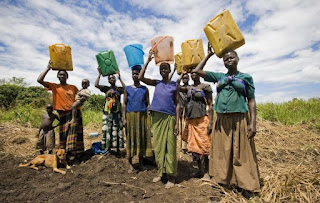Introduction: Rethinking women and water
Why water and gender?
Throughout my education, women and their role in rural Africa have often been forgotten or given a passive narration only known for their suffering, as Wainaina (2006) highlights. Maybe topics surrounding women, such as period poverty and sexual violence, were too taboo for my high-school teachers, or maybe it just wasn’t important enough. Regardless, my education on women in Africa is limited, and for that reason, I have chosen to expand my knowledge and change my perception (and hopefully yours) of women in Africa.
A few days ago was ‘International Day of Rural Women, which last year’s theme was “Rural Women Cultivating Good Food for All” this theme celebrated rural women, highlighting the essential roles of women in agriculture, water efficiency and climate resilience. I think it is often forgotten that women are powerful and have a very meaning full role in rural Africa. This national day inspired me to choose gender and water as there needs to be more celebration of women.
How to write about Africa:
Through reading ‘How to Write about Africa’, a sarcastic piece by Binyavanga Wainaina (2006) that forces us to reconsider how we (the west) view and portray Africa, I have been more Enlighted to the fact that western portrayals of Africa can be harmful. A key quote that stuck with me from this reading is:
This section is a fascinating commentary on how the west picture African women as ‘Helpless’ and passive characters who need the west to provide them with access to water. Throughout this blog, I hope to change this perception ingrained in our imaginations and see African women as agents of change who can empower themselves and others around them without help from the west. Furthermore, it is essential that this blog doesn't fall into the cliché of only talking about women’s suffering, but instead highlight the positives of woman and water, like how they have knowledge, responsibility and poupous when it comes to agriculture as well as community and friends when they collect water.
Therefore, in this blog, I will try to ensure that harmful imagery and generalisation are avoided. Although (and I am not trying to make excuses for my ignorance), as a white English woman whose mind might have been warped to stereotypical narratives on TV and in Christmas songs (we all know the one), I still may fall into naïve traps. However, I aim to educate myself, as well as you, the reader, over the course of this blog to have a new portrayal of Africa.
Women and water in Africa:
In their paper Kameri-Mbote (2008) talks of the inequalities, suggesting that patriarchal cultural traditions mean women rarely own land and aren’t allowed to make decisions about its use. However, women spend the most time on the land as in Africa 80% of the farming, agriculture and livestock production workforce are women (Boserup, 1970 in Kameri-Mbote 2008). Moreover, Hellum et al. (2015) discuss the rights to water, suggesting that women are the last to have access to water, especially in Kenya, where women farmworkers are at “the bottom of the water hierarchy” (p25). Women’s lack of access to water and discissions around poses a threat to the agricultural development of rural Africa. This threat is only exacerbated by the increased effects of climate change.
Many organisations, such as the FAO (2022) and World Bank (2022), see rural women as the key to ending hunger and building climate resilience through their knowledge of water efficiency and agriculture. As a result, they call for the empowerment of women, so their voices can be heard in talks around sustainability, development and climate management. I look forward to seeing how (and if) rural women are included in COP27 talks in a few days.


This is a good start on the issue of water and gender in Africa, hopefully more specific case studies will be explored in future posts.
ReplyDelete